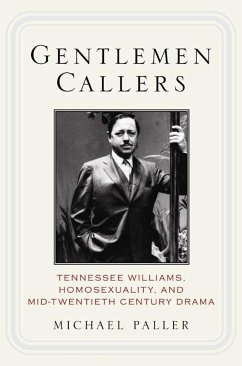Gentlemen Callers provides a fascinating look at America's greatest Twentieth-century playwright and perhaps the most-performed, even today. Michael Paller looks at Tennessee Williams's plays from the 1940s through the 1960s against the backdrop of the playwright's life story, providing fresh details. Through this lens Paller examines the evolution of Mid-Twentieth-century America's acknowledgment and acceptance of homosexuality. From the early Cat on a Hot Tin Roof and one-act Auto-da-Fé , through The Two-Character Play and Something Cloudy, Something Clear , Paller's book investigates how Williams's earliest critics marginalized or ignored his gay characters and why, beginning in the 1970s, many gay liberationists reviled them. Lively, blunt, and provocative, this book will appeal to anyone who loves Williams, Broadway, and the theater.
'Like a great actor inhabiting one of Tennessee Williams' characters, Michael Paller brings intelligence, nuance and considerable artistry to the complex figure of the man himself. He shatters the mythology surrounding Williams - that he was an innately tragic, self-loathing homosexual - and bravely recontextualizes him not only as an incomparable artist, but as a ground-breaking social pioneer. His book is a welcome re-evaluation of one of our most revered and misunderstood American originals.' - Doug Wright, Pulitzer Prize winning author of I Am My Own Wife
'Tennessee Williams was America's most original dramatic talent. He was also gay. The significance of this fact is explored by Michael Paller in a book full of striking insights into the man, the plays, and the theatre of which he was a part. What emerges from this study is a familiar figure seen in a new complexity. What also emerges is an America whose oppressive laws and casual cruelties toward those who shared his sexuality in part created the pressures that created the context, if not always the subject, of his art.' - Christopher Bigsby, Professor of American Studies at the University of East Anglia and Director of the Arthur Miller Centre
'Gentlemen Callers and Michael Paller look at the writing of Tennessee Williams through a gay perspective that is insightful and blessedly free from many of the distortions and exaggerations that previous studies have indulged in. It will be of interest totheatre goers and practitioners alike.' - Michael Kahn, Artistic Director, The Shakespeare Theatre
'Michael Paller's Gentleman Callers offers an innovative, perceptive, and very readable examination of the works Tennessee Williams produced in his long and productive career...Paller reveals the extent to which misguided 'political correctness' among some recent critics has prevented a judicious reading of the works. This sensitive and informed analysis is destined to become a major addition to Williams scholarship, offering insights to both long-time Williams fans and scholars and to those unfamiliar with his work.' - Kenneth Holditch, author of Tennessee Williams and the South and founding editor of The Tennessee Williams Journal
'...an insightful debunking of the conventional wisdom characterizing the theatre icon as a tragic figure, a self-hating homosexual inherently incapable of true happiness. Instead, in Paller's thoughtful and convincing re-evaluation of both the playwright and his plays, William's emerges a ground-breaking figure on both personal and professional grounds, an ironically happy ending for an envelope-pusher who freed the stage from that very same convention.' - ELLE Magazine
'Tennessee Williams was America's most original dramatic talent. He was also gay. The significance of this fact is explored by Michael Paller in a book full of striking insights into the man, the plays, and the theatre of which he was a part. What emerges from this study is a familiar figure seen in a new complexity. What also emerges is an America whose oppressive laws and casual cruelties toward those who shared his sexuality in part created the pressures that created the context, if not always the subject, of his art.' - Christopher Bigsby, Professor of American Studies at the University of East Anglia and Director of the Arthur Miller Centre
'Gentlemen Callers and Michael Paller look at the writing of Tennessee Williams through a gay perspective that is insightful and blessedly free from many of the distortions and exaggerations that previous studies have indulged in. It will be of interest totheatre goers and practitioners alike.' - Michael Kahn, Artistic Director, The Shakespeare Theatre
'Michael Paller's Gentleman Callers offers an innovative, perceptive, and very readable examination of the works Tennessee Williams produced in his long and productive career...Paller reveals the extent to which misguided 'political correctness' among some recent critics has prevented a judicious reading of the works. This sensitive and informed analysis is destined to become a major addition to Williams scholarship, offering insights to both long-time Williams fans and scholars and to those unfamiliar with his work.' - Kenneth Holditch, author of Tennessee Williams and the South and founding editor of The Tennessee Williams Journal
'...an insightful debunking of the conventional wisdom characterizing the theatre icon as a tragic figure, a self-hating homosexual inherently incapable of true happiness. Instead, in Paller's thoughtful and convincing re-evaluation of both the playwright and his plays, William's emerges a ground-breaking figure on both personal and professional grounds, an ironically happy ending for an envelope-pusher who freed the stage from that very same convention.' - ELLE Magazine









